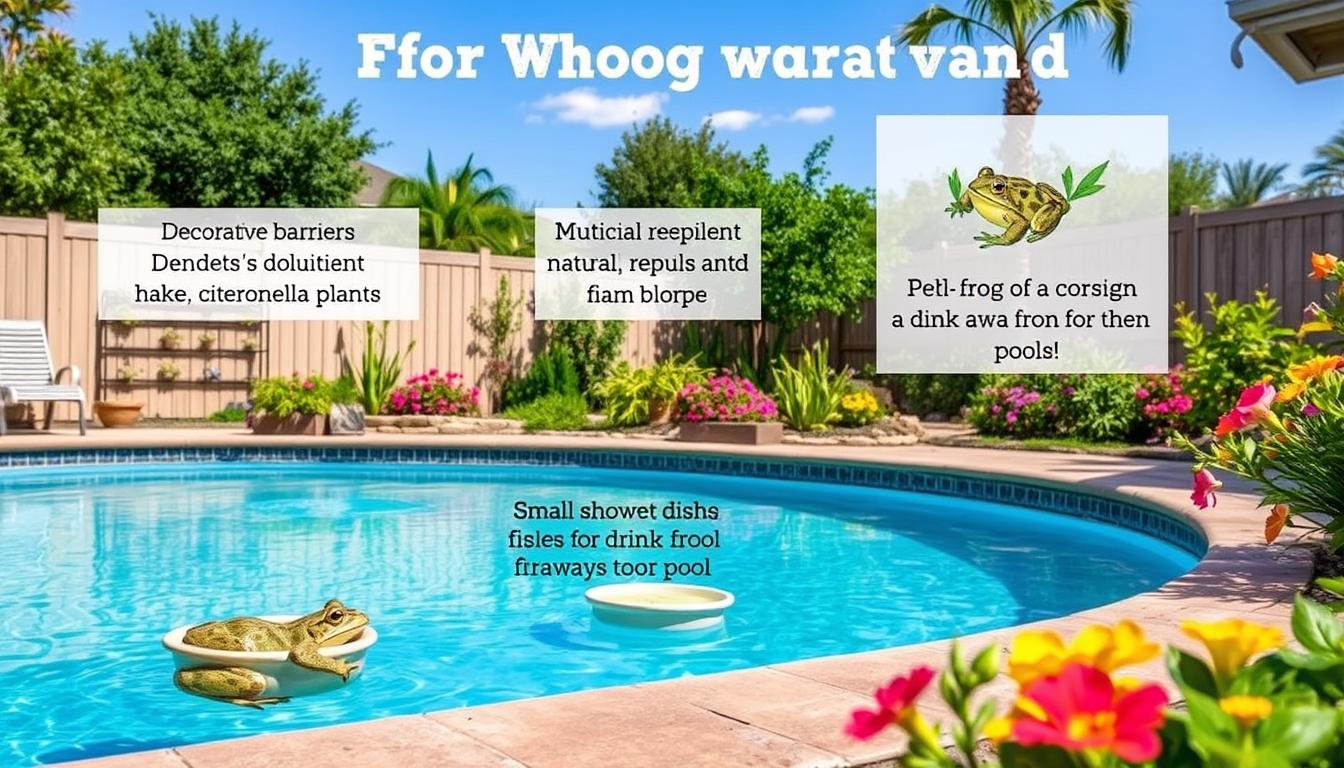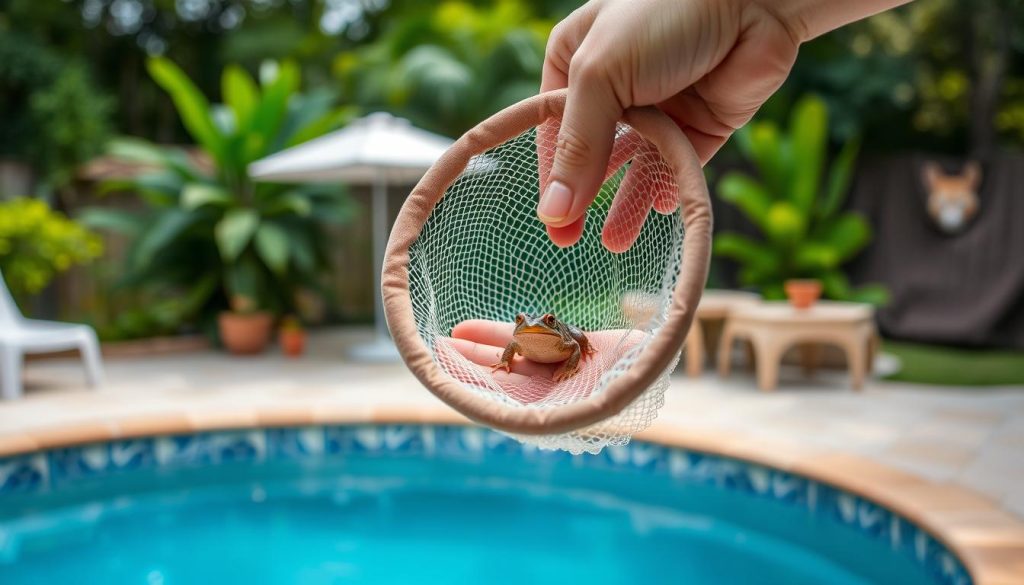
Imagine a warm summer evening ruined by croaking frogs in your pool. These amphibians can quickly become a nuisance. They compromise the cleanliness and enjoyment of your swimming oasis.
Many pool owners face this problem during summer when frogs are most active. But don’t worry, there are effective ways to deal with it.
We’ll explore several strategies to remove frogs from your pool. These include humane control methods and natural repellents. Our expert tips will help you eliminate frogs near your pool area.
You’ll learn how to keep frogs away from your backyard pool for good. By using these proven techniques, you can enjoy a frog-free swimming experience all summer.
Understanding Frog Behavior and Attraction to Pools
Frogs are drawn to swimming pools for survival, shelter, and breeding. They see pools as inviting ponds with consistent water. Understanding their behavior helps create targeted solutions for the 7,700 frog species worldwide.
Why Frogs Are Drawn to Swimming Pools
Pools offer frogs a safe haven from natural predators. Algae problems provide food and camouflage for frogs. Bright lights attract insects, which frogs prey upon.
Nearby vegetation or debris offers hiding spots and shade. Comfortable frogs may lay eggs, potentially leading to tadpole infestations if unchecked.
- Recurring algae problems, providing a food source and camouflage
- Bright lights surrounding the pool that attract insects, which frogs prey upon
- Nearby vegetation or debris offering hiding spots and shade
When frogs become too comfortable in a pool environment, they may lay eggs, potentially leading to a tadpole infestation if left unchecked.
Potential Risks of Frogs in Pools
Frogs in swimming pools can pose several risks. Chlorinated water can harm frogs, causing dehydration and death. Frog droppings and egg masses can contaminate pool water.
- Chemical exposure: Chlorinated water can be harmful to frogs, as their permeable skin absorbs water and any chemicals present, potentially causing dehydration and death.
- Unsanitary conditions: Frog droppings and decaying egg masses can contaminate pool water, requiring additional cleaning and maintenance.
- Clogged filters: Tadpoles and other debris associated with frogs can clog pool filters, reducing their efficiency and lifespan.
Identifying Protected Frog Species
Before removing frogs, identify the species present. In Florida, 30 frog species breed, with four introduced by humans. Some species are invasive and harmful to native wildlife and pets.
Certain frogs are protected under the U.S. Endangered Species Act. Harming these species can lead to ecological problems and legal penalties.
| Protected Frog Species | Native Range | Conservation Status |
|---|---|---|
| California Red-Legged Frog | California and Northern Baja California | Threatened |
| Chiricahua Leopard Frog | Arizona, New Mexico, and Mexico | Threatened |
| Mississippi Gopher Frog | Mississippi and Louisiana | Endangered |
Understanding frog behavior and risks helps develop effective strategies. We can maintain a frog-free pool while protecting important species. This knowledge allows for humane solutions to keep pools clean and safe.
Humane Methods for Removing Frogs from Your Pool Area
Maintaining a clean and safe pool is crucial. Frogs can disrupt this balance. Let’s explore effective and kind ways to remove frogs from your pool.
We’ll look at humane methods for humane frog removal and relocation. These techniques ensure the frogs’ well-being while keeping your pool area frog-free.

Using a Net to Safely Capture and Relocate Frogs
A fine mesh net is gentle for safe frog capture. Scoop up frogs, tadpoles, and egg masses from the pool surface. Transfer them to a bucket with pool water.
For frog relocation, release them into a suitable natural habitat. Choose a nearby pond, stream, or wetland area. This lets frogs thrive without returning to your pool.
Creating a Frog Ramp for Easy Escape
Frogs often struggle to escape pools due to slippery sides. A frog ramp provides a safe exit. Use a foam pool noodle or a floating platform.
Secure the ramp to the pool’s edge. Ensure it extends into the water at a gentle slope. Frogs will climb out, reducing drowning risks.
Employing Natural Repellents like Coffee Grounds or Lemon Juice
Natural frog repellents deter frogs without harm. Coffee grounds and lemon juice work well. Place them around your pool’s perimeter.
Spread coffee grounds or spray lemon juice mixture near the pool. These create a barrier frogs dislike. The strong scent discourages frogs from entering.
“By implementing these humane methods for frog removal and relocation, we can maintain a frog-free pool while respecting the well-being of these amphibious creatures.”
| Method | Advantages | Tools Required |
|---|---|---|
| Net Capture and Relocation | Safe and gentle removal, ensures frogs are relocated to suitable habitat | Fine mesh net, bucket |
| Frog Ramp | Allows frogs to safely exit pool, reduces risk of drowning and chemical exposure | Foam pool noodle, floating platform, or FrogLog |
| Natural Repellents | Eco-friendly deterrent, discourages frogs from approaching pool area | Coffee grounds, lemon juice, spray bottle |
Preventing Frogs from Entering Your Pool
Keep your pool clean and enjoyable by preventing frogs from entering. Effective strategies maintain a healthy swimming environment and avoid risks from amphibian intrusions. Proactive measures are key to keeping frogs out of your pool area.
Installing a Secure Pool Cover
A well-fitted pool cover is an effective frog deterrent. Safety covers and automatic pool covers create secure barriers without gaps. These high-quality covers significantly reduce the chances of frogs accessing your swimming area.
Erecting a Solid Pool Fence as a Physical Barrier
A solid pool fence around your pool area is crucial. Choose a fence with tight mesh or solid panels to discourage frogs. Proper maintenance and gap-free fences minimize amphibian intrusions effectively.
Maintaining Proper Pool Temperature with a Heater or Solar Cover
Frogs prefer cooler water for breeding. Keep your pool warm with a heater or solar cover. This creates an environment less appealing to frogs while enhancing your swimming experience.
Keeping Outdoor Lights Off at Night to Reduce Insect Attraction
Frogs are drawn to areas with insects for food. Turn off outdoor lights at night to reduce insect attraction. Install an automatic timer for convenience during peak insect and frog activity hours.
Minimizing insect populations near your pool decreases its appeal to hungry frogs. This simple step can significantly reduce frog visits to your pool area.







